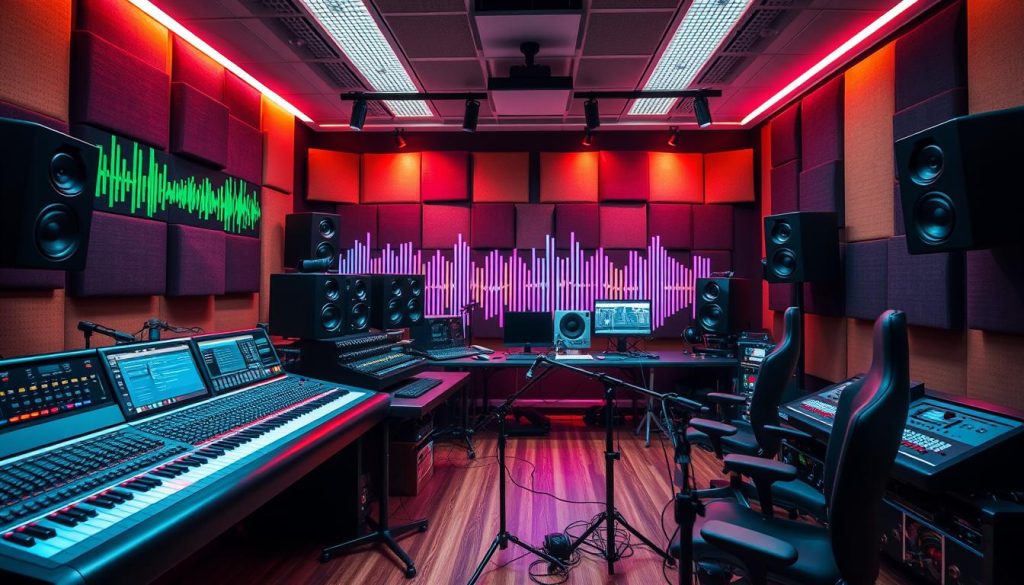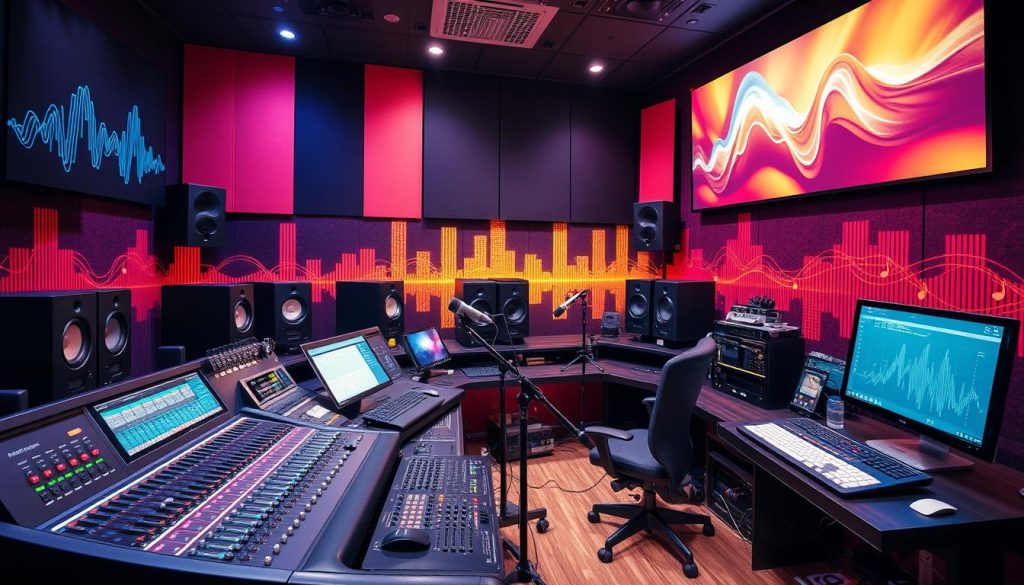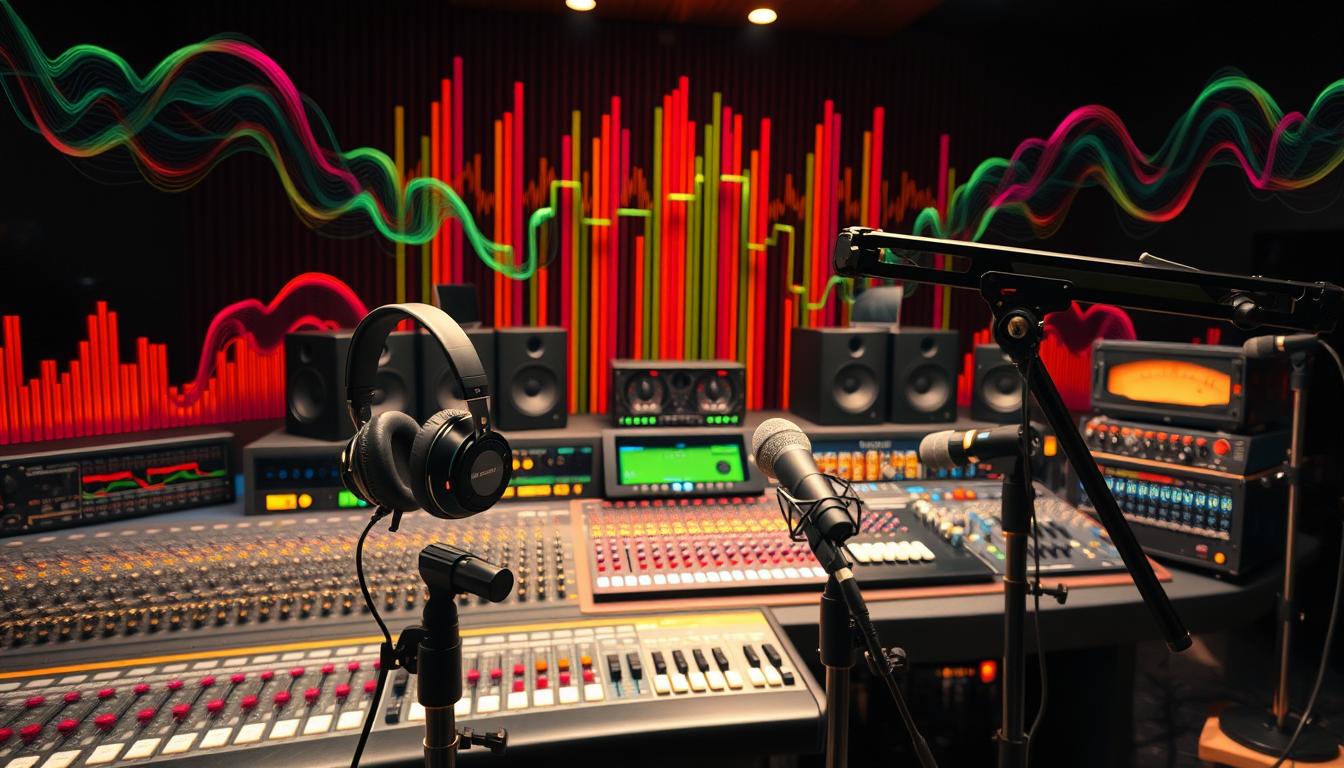I’ve always been drawn to the art of sound production. It’s a world full of details and subtleties. In this guide, I’ll share the key techniques, gear, and secrets to improve your audio skills. You’ll learn how to make professional-quality sound.
This guide is for both new and experienced audio engineers. It covers all stages of audio production, from recording to mastering. You’ll find out about the mastering engineer’s role and the latest techniques. You’ll also learn what makes successful audio engineers stand out.
We’ll explore audio engineering, sound production, audio mixing, music production, recording studio, and mastering techniques. Get ready to gain the knowledge and skills to take your audio to the next level.
Understanding the Role of a Mastering Engineer
In the world of music, mastering engineers play a key role. They make sure the sound is ready for the radio. I’ve worked with many artists, helping them make their music sound great.
What Mastering Engineers Actually Do
Mastering engineers do more than just press buttons. We mix technical skills with creativity. We use special tools to make the music sound perfect.
We adjust levels and balance sounds. We also add final touches to make the music sound great on any system. This includes things like compression and stereo imaging.
Our main job is to keep the mix’s original feel while making it sound better. We work with the artist and the mixing engineer to get it right. Then, we refine the sound to make sure it sounds good to listeners.
We fix issues like digital clipping and noise. This makes the music sound clean and ready for the radio. This is key in music production and post-production. It affects the sound quality listeners hear.
As a mastering engineer, I’m proud to be the last step in making music sound great. It’s a rewarding job that needs both technical knowledge and artistic sense.
Mastering Techniques for Audio Engineers
Mastering is key for audio engineers. It makes sure a track sounds great on all systems and formats. By using special techniques, we can make our mixes sound amazing and professional.
Equalization (EQ) is a basic technique. It lets us change a track’s sound balance. We can make certain sounds clear or quiet others. A good engineer uses EQ to make a mix sound clear, warm, or strong.
Dynamic range compression is also vital. It makes a track sound consistent and strong. It helps control loud and quiet parts, making the sound smooth and polished.
Stereo imaging is crucial too. It makes the sound wider and deeper. Engineers adjust the stereo balance or use special techniques for a better sound.
Limiting is the last step. It makes a track loud without distortion. The right amount of limiting makes the track stand out among others.
By mastering these techniques, audio engineers can make great mixes even better. They turn good recordings into professional-sounding tracks.
| Mastering Technique | Description | Benefits |
|---|---|---|
| Equalization (EQ) | Adjusting the frequency balance of a track | Enhances clarity, warmth, or punch; tames problem areas |
| Dynamic Range Compression | Controlling the dynamic range of a track | Creates a more consistent and impactful listening experience |
| Stereo Imaging | Manipulating the width and depth of the stereo field | Produces a more immersive and engaging listening experience |
| Limiting | Maximizing the overall volume of a track | Pushes the overall level of the track without introducing distortion |
The Sound Engineering Guide: Master Audio Production

Popular Audio Engineering Techniques
I’ve explored many techniques that make music sound better. These go beyond just mastering. They include things like how to place microphones and using effects like reverb and delay.
Editing and splicing is one of my top techniques. It means cutting and joining parts of a recording to make it sound better. Mixing is also key. I use things like ducking and EQ matching to make each part of the music stand out.
Sound design is also very important. I use tools like synthesizers to make new sounds. This lets me create cool textures, like deep basslines or space sounds.
Mastering these techniques helps turn simple recordings into amazing music. By always learning new things, I can make music that really moves people.
Essential Skills for Audio Engineers

As an audio engineer, you make sound come alive and improve how people hear it. To do well, you need both technical skills and creativity. Let’s look at the key skills you need to move forward in your career.
In-Depth Knowledge of Audio Equipment and Software
Knowing how audio equipment and software work is key to your success. You should be familiar with everything from microphones to digital audio workstations (DAWs). This knowledge lets you fix problems, improve performance, and get the best out of your tools.
Keen Listening Skills and Music Theory Expertise
Being able to listen carefully and know music theory is crucial. A sharp ear helps you spot and fix small sound issues. Music theory knowledge helps you work well with artists and producers, bringing their ideas to life.
Problem-Solving and Adaptability
Audio engineering is always changing, with unexpected problems popping up. You need to be good at solving problems and adjusting as needed. Being creative in solving technical issues and changing your approach for different projects is key.
Effective Communication and Attention to Detail
You’ll work with many people in the music industry. Good communication and attention to detail are important. They help you build strong relationships, meet client expectations, and deliver great results.
Developing these skills will help you become a top audio engineer. You’ll be able to shape the sound in music, movies, and more. Remember, getting better takes continuous learning, being adaptable, and loving audio production.
| Essential Audio Engineering Skills | Description |
|---|---|
| Audio Equipment and Software Expertise | In-depth knowledge of microphones, mixers, digital audio workstations (DAWs), and audio plugins |
| Keen Listening Skills and Music Theory | Ability to critically analyze sound and apply music theory principles |
| Problem-Solving and Adaptability | Capacity to troubleshoot issues and adjust to changing project requirements |
| Effective Communication and Attention to Detail | Strong interpersonal skills and meticulous focus on delivering high-quality results |
Career Opportunities in Audio Engineering
As an aspiring audio engineer, I’m excited to share the diverse career paths available. The audio and music industries are thriving, offering many opportunities for skilled professionals like me. You can work as a recording or mixing engineer in professional studios or as a sound designer for films, TV, and video games.
Live sound engineering is another great career choice. Here, I can make sure the audio is perfect at concerts, festivals, and corporate events. The need for quality sound in media like broadcast and streaming has also created jobs in audio post-production and media sound design.
If you love the music industry, you might like being a music producer, recording engineer, or audio editor. These jobs let you work with talented artists and help shape today’s music. Or, if you want to teach, you can become an audio engineering teacher at colleges, universities, or specialized programs. This way, you can inspire the next generation of audio pros.

